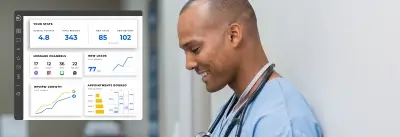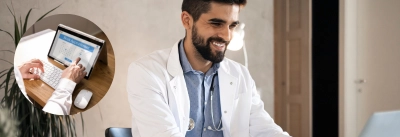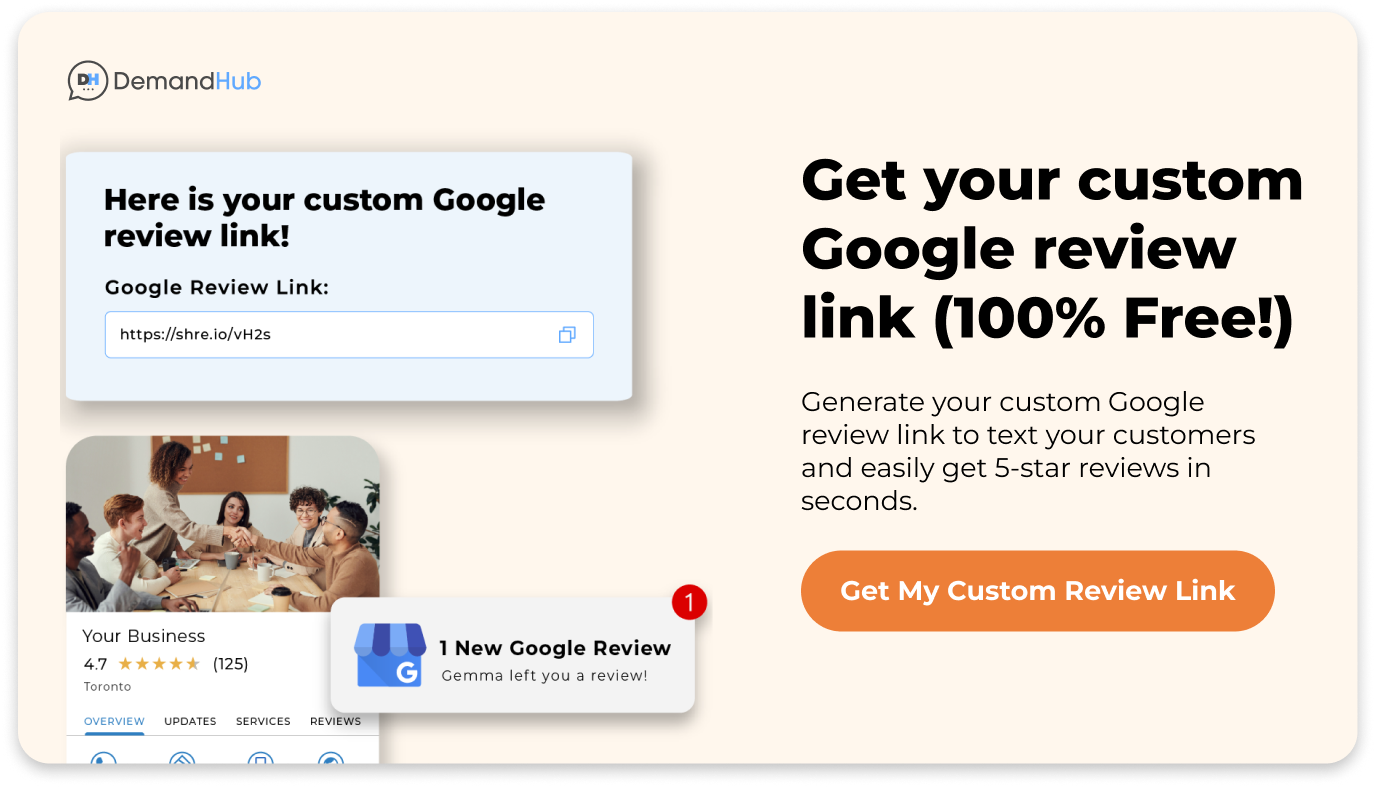11 Appointment Reminder Templates to Reduce No-Shows in 2024
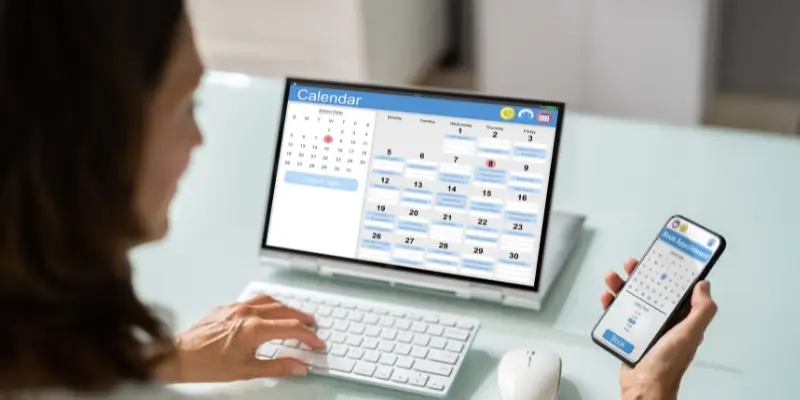
Appointments can slip through the cracks more often than you’d think. Surprisingly, in the healthcare industry, the no-show rates can skyrocket, reaching an eye-popping 80% in certain regions.
It’s a big deal because it means healthcare providers lose $150 billion in revenue annually. But here’s the good news: appointment reminders are about to become your secret weapon. Staying in touch with your clients is vital; these appointment reminders are the key to that puzzle.
Whether you’re running a healthcare practice, managing a service-based business, or just want to up your appointment game, we’ve got your back.
In this article, we’ll introduce you to 11 appointment reminder templates to help you cut down on no-shows, enhance client communication, and boost your bottom line.
So, let’s jump right in and discover how these simple yet powerful tools can transform your appointment management.
Table of Contents- Valuable Tips to Create the Perfect Appointment Reminder
- SMS Reminder Templates
- Appointment Reminder Email Templates
- Innovative Methods to Prevent No-Shows
- 3 Best Practices of Client Communication
- Adapting Templates for Different Industries
- Frequently Asked Questions About Appointment Reminders
Valuable Tips to Create the Perfect Appointment Reminder
Creating the perfect appointment reminder is all about clarity and effectiveness. Here are some tips to ensure your reminders hit the mark:
Tone and Language Tips
- Be Clear and Concise: Keep your message short and to the point. Avoid unnecessary jargon or complicated language. Your clients should instantly understand the purpose of the message.
- Friendly and Polite: Use a friendly and courteous tone. Remember, you’re reminding them, not scolding. A little politeness goes a long way in maintaining a positive client relationship.
- Include Relevant Details: Clearly state the appointment’s date, time, and location. Don’t forget to mention any preparation or special instructions.
- Confirmation: Encourage clients to confirm their attendance or reschedule if needed. This helps you plan better and reduces no-shows.
Essential Elements to Include
- Client’s Name: Personalize the reminder by addressing the client by their name. It adds a personal touch and grabs their attention.
- Appointment Details: Include the appointment’s date, time, and location. Ensure this information is accurate and easy to read.
- Contact Information: Provide a contact number or email if they need to reach you. It shows you’re readily available to assist.
- Cancellation/Rescheduling Instructions: Clearly outline your policy for canceling or rescheduling appointments. Make it easy for clients to follow the procedure.
- Additional Information: If any specific requirements or preparations are needed for the appointment, mention them. This helps clients come prepared.
SMS Reminder Templates
SMS reminders reign supreme, with an open rate of 98%. It shows it’s the preferred mode of client communication. And why not? They are efficient, direct, and more likely to be read promptly than emails.
Let’s dive into crafting effective SMS reminder templates for your business.
Key Elements for Effective SMS Reminders
Begin with your business name. Your client must recognize who the message is from immediately. Address the client by name to add a personal touch, fostering a stronger connection and higher response rate.
Keep the message short and to the point. SMS is all about brevity, delivering essential information in the least number of words.
Moreover, clearly state the appointment’s date, time, and location. Avoid any ambiguity that could lead to confusion. If necessary, include a clear call-to-action, such as how to confirm or reschedule the appointment.
Short and Direct SMS Reminder Template
“Hi [Client Name], this is a reminder from [Your Business Name] about your appointment on [Date] at [Time]. Please reply with ‘YES’ to confirm or call [Phone Number] to reschedule. See you soon!”
Personalized SMS Reminder Template
“Good day [Client Name]! We at [Your Business Name] are looking forward to seeing you for [Service] on [Date] at [Time]. If you have any questions, feel free to contact us at [Phone Number]. To confirm, please reply ‘YES.’ Thank you!”
In both templates, the emphasis is on delivering all the necessary information while maintaining a tone that reflects your brand’s personality.
Whether you opt for a more formal or casual approach, the key lies in balancing professionalism with a sense of personal connection.
Appointment Reminder Email Templates
Effective appointment reminder emails blend professionalism, clarity, and a touch of personalization. They are vital in ensuring customers remember and commit to their appointments.
Let’s explore the essential elements to include in these emails and provide templates for different styles: formal, casual, and detailed.
Key Elements for Effective Email Templates
- Subject Line: A clear, engaging subject line that indicates the purpose of the email (e.g., “Upcoming Appointment Reminder”).
- Personalization: Address the customer by name to establish a connection and show attentiveness.
- Appointment Details: Clearly state the appointment’s date, time, and nature.
- Your Business Information: Include the name and contact details of your business.
- Actionable Steps: Instructions for confirming, rescheduling, or canceling the appointment.
- Additional Information: Any relevant details such as location, what to bring, or preparation instructions.
- Professional Tone: Ensure the email reflects the professionalism of your business.
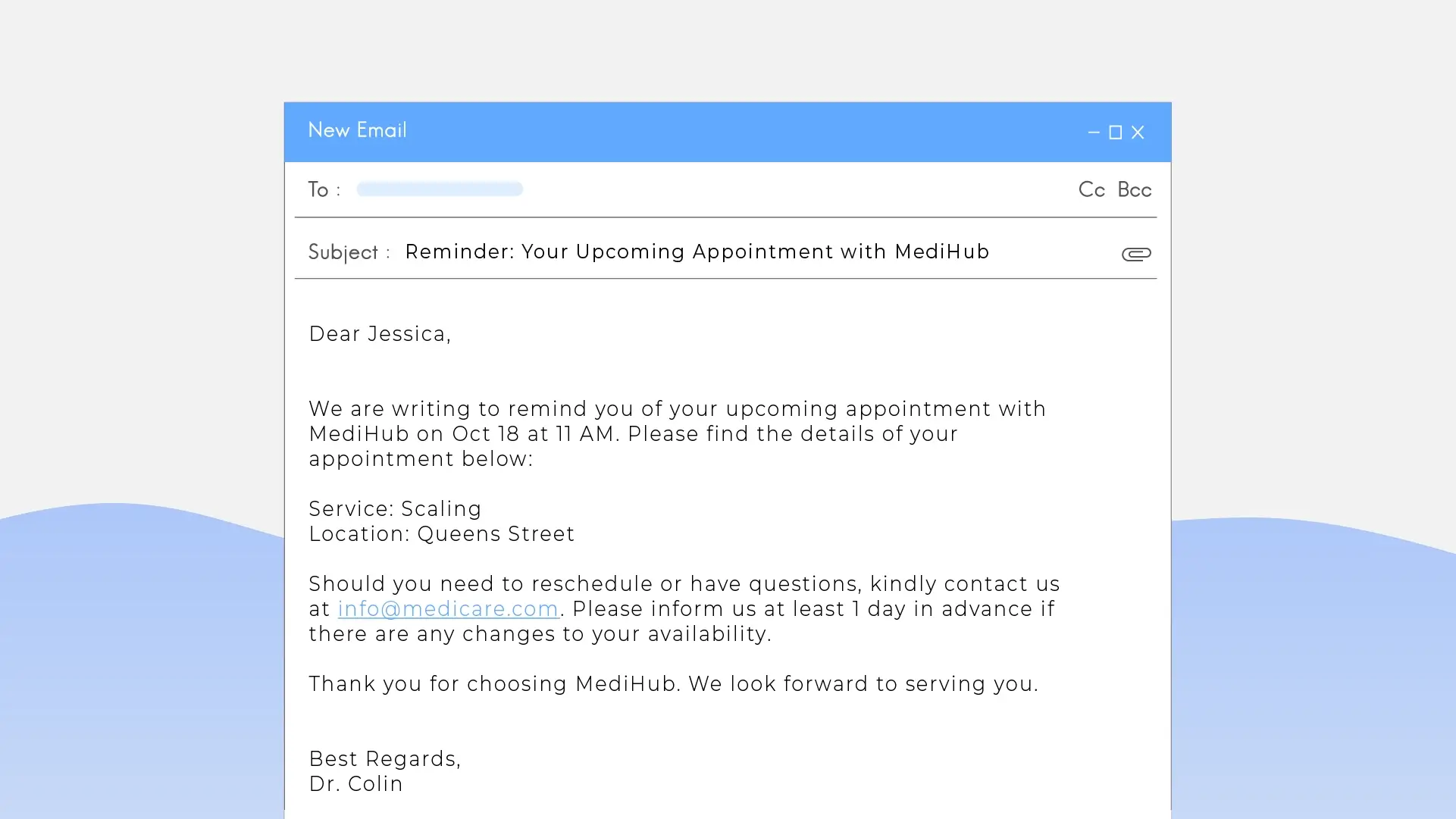
1. Formal Email Reminder Template
Subject: Reminder: Your Upcoming Appointment with [Business Name]
Dear [Client’s Name],
We are writing to remind you of your upcoming appointment with [Business Name] on [Date] at [Time]. Please find the details of your appointment below:
Service: [Service Description] Location: [Location]
Should you need to reschedule or have questions, kindly contact us at [Contact Information]. Please inform us at least [Time Frame] in advance if there are any changes to your availability.
Thank you for choosing [Business Name]. We look forward to serving you.
Best regards, [Your Name] [Your Position]
2. Casual Email Reminder Template
Subject: Hey [Client’s Name], Ready for Your Appointment?
Hi [Client’s Name]!
Just a quick heads-up about your appointment with us at [Business Name] on [Date] at [Time]. We’re all set to offer you [Service Description]!
If you’ve got any questions or need to make a change, just shoot us an email or call at [Contact Information]. We’re here to help!
Can’t wait to see you!
Cheers, [Your Name]
3. Detailed Email Reminder Template
Subject: Your Appointment Details with [Business Name] – [Date]
Hello [Client’s Name],
We are looking forward to your appointment with [Business Name] on [Date] at [Time]. Here are the details you need to know:
Service: [Service Description] Location: [Location] Duration: [Duration] What to bring: [Items to Bring] Preparation instructions: [Instructions]
If there are any changes to your schedule or if you have any specific requests, please contact us at [Contact Information] at your earliest convenience.
Thank you for choosing [Business Name], and we are excited to provide you with our best service.
Warm regards, [Your Name] [Your Position]
These reminder templates can reduce no-shows and enhance the overall client experience. Remember to align the tone and details of the reminder email with your brand’s voice and client expectations.
Innovative Methods to Prevent No-Shows
No one likes to deal with no-shows – they’re like uninvited rain on your parade. To keep them at bay, let’s look at some methods to help ensure your clients remember their appointments and show up as promised.
1. 24 Hours Before Appointment Reminder
Shoot a reminder to your clients 24 hours before their appointment. This reminder acts as a gentle nudge, ensuring the appointment is fresh in your client’s mind and giving them a chance to reschedule if something comes up.
Here’s how you can frame it:
“Hey [Client’s Name]! Just a quick reminder from [Your Business Name] about your appointment tomorrow at [Time]. If you’ve got any last-minute questions or need to reschedule, give us a shout at [Contact Information]. Looking forward to seeing you!”
The idea here is to be light, friendly, and open. You’re giving them a chance to reach out if they need to, making them feel comfortable and valued.
2. Final Appointment Confirmation Reminder
This is your last line of defense against no-shows, and works like a charm. A final reminder, sent a few hours before the appointment, is like that last check before leaving the house – did you forget anything? This reminder helps your client do just that – a final check.
“Good morning, [Client’s Name]! Your appointment at [Your Business Name] is coming up in a few hours at [Time]. We can’t wait to see you! If something comes up, just let us know. Otherwise, we’re all set for you.”
Using these reminders reduces the chances of no-shows and builds a relationship with your clients. It shows them that you care and are looking forward to their visit. It’s a simple touch, but it goes a long way!
3. Incorporating Incentives
Offering incentives can be a powerful motivator for clients to keep their appointments. Consider rewards like discounts on future services, loyalty points, or small freebies for clients who show up as scheduled.
Make sure to communicate these incentives in your appointment reminders. For example:
“Remember, showing up for your appointment at [Business Name] on [Date] earns you points towards a discount on your next visit!”
4. Using Technology and Tools
Leverage technology to reduce no-shows. This can include online booking systems that allow clients to quickly reschedule, automated reminder systems, or mobile apps that send push notifications about upcoming appointments.
These tools make it convenient for clients to manage their appointments and for you to keep track of your schedule.
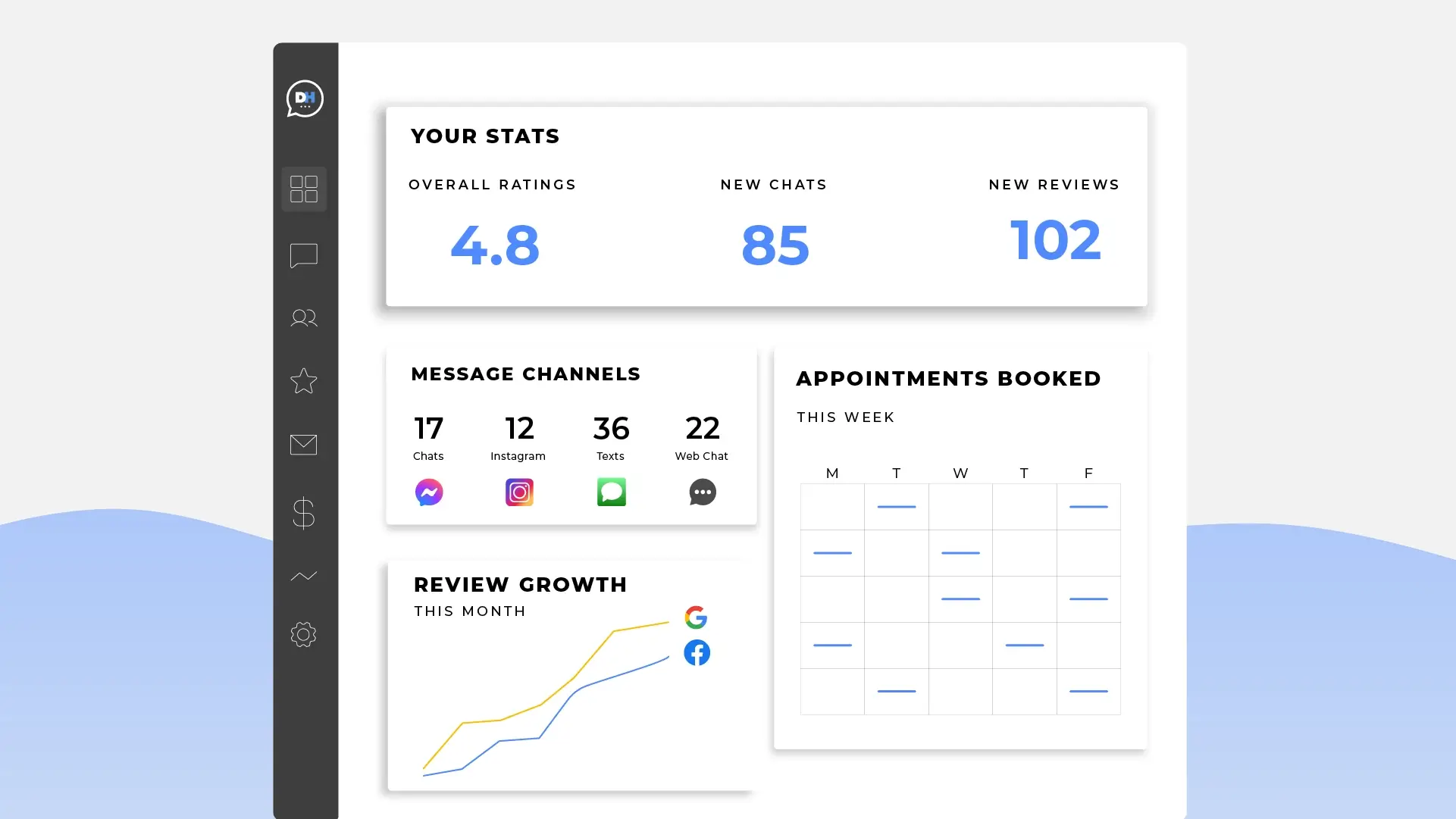
One such comprehensive solution is Demandhub. It offers a suite of features that encompasses all these capabilities. With Demandhub, you can set up an intuitive online booking system, automate your appointment reminders, and even send timely push notifications through its mobile app.
Integrating various functionalities into one platform streamlines the process, making it easier for your business and clients to stay on top of scheduled appointments. Adopting a tool like Demandhub can significantly enhance your ability to manage appointments and minimize no-shows effectively.
3 Best Practices of Client Communication
Effective communication with clients builds trust and maintains a positive business relationship.
Here are some best practices focusing on professionalism, timing, and automation in appointment reminders.
1. Professionalism and Politeness
Always maintain a professional and polite tone in your communications. This means using courteous language and a respectful tone, regardless of the medium – be it email, SMS, or phone calls.
Address clients by their names, and ensure your messages are clear and error-free. Professionalism in your communication reflects the quality of service your business provides.
2. Timing and Frequency of Messages
Timing is everything when it comes to appointment reminders. Send them out when clients are likely to read and remember them – not too early or too late. A common practice is to send a reminder a week in advance, followed by another one 24 hours before the appointment.
Be mindful of the frequency of your messages; over-communicating can overwhelm or annoy clients, leading to a negative impression of your business.
3. Automating Appointment Reminders
Automation can be a game-changer for managing appointment reminders efficiently. Use HIPAA-compliant scheduling software like DemandHub to send reminders at predetermined intervals automatically.
This not only saves time but also reduces the chances of human error. Automated reminders must still be personalized and tailored to each client to maintain a personal touch.
With automation, you can focus more on providing quality service while the system handles the reminders.
Adapting Templates for Different Industries
Using appointment reminder templates is not a one-size-fits-all solution. Different industries have unique needs and expectations when it comes to communication.
Let’s explore how you can adapt these templates for three specific sectors:
- healthcare,
- automotive,
- professional services.
1. Healthcare Sector
In the healthcare industry, reminders must be empathetic and informative, providing patients with all the necessary details about their upcoming appointments. These templates should include:
- The name of the healthcare provider
- Date, time, and location of the appointment
- Any preparation instructions (e.g., fasting for a blood test)
- A gentle reminder about the importance of health check-ups
For example:
“Hello [Patient Name], this is a reminder from [Clinic/Hospital Name] for your appointment with Dr. [Doctor’s Name] on [Date] at [Time]. Please remember to [specific instructions]. Your health matters to us. Call [Phone Number] for any questions.”
2. Automotive Sector
For automotive appointments, reminders should be straightforward, highlighting the service and offering convenience. Elements to include:
- Service type (e.g., maintenance, repair)
- Expected duration of the service
- Any special offers or promotions
For example:
“Hi [Customer Name], just a quick reminder from [Service Center Name] about your car’s [Service Type] appointment on [Date] at [Time]. We’ll get you back on the road safely! Call us at [Phone Number] for any queries.”
3. Professional Services
In professional services like legal, financial, or consulting, reminders should be formal and respectful, ensuring clients are well informed about their appointments.
Key details to include:
- The nature of the appointment (e.g., consultation, review meeting)
- Confidentiality reminders, if needed
- Contact details for rescheduling or queries
For example: “Dear [Client Name], a reminder of your upcoming [Appointment Type] with [Professional’s Name] at [Business Name] on [Date] at [Time]. Please bring any relevant documents. For changes to your appointment, contact us at [Phone Number].”
Adapting appointment reminder templates to suit your industry’s needs enhances communication effectiveness. It also demonstrates your understanding and respect for your client’s unique requirements.
Frequently Asked Questions About Appointment Reminders
What Makes an Effective Appointment Reminder?
An effective appointment reminder is clear, concise, and timely. It should include the date, time, location (if applicable), and a brief mention of the appointment’s purpose.
Personalization, like addressing the client by name, also enhances its effectiveness. The key is to convey all necessary information without overwhelming the recipient.
How Far in Advance Should I Send an Appointment Reminder?
Typically, it’s best to send an initial reminder a week in advance, followed by a second reminder 24 hours before the appointment. This timing gives clients enough notice to adjust their schedules and reduces the likelihood of no-shows.
What’s the Difference Between SMS and Email Reminders in Terms of Effectiveness?
SMS reminders are generally read more quickly and have higher open rates, making them effective for last-minute communications.
While not as immediate, email reminders allow for more detailed information and are better suited for initial, more formal communications. The choice depends on the urgency of the message and the preferred communication method of your customers.
How Can I Customize My Reminders for Different Client Demographics?
Customizing reminders can involve adjusting the language, tone, and content based on the client’s age, preferences, or previous interactions.
A more casual tone is appropriate for younger clientele, while older customers prefer a more formal approach. Also, consider language preferences and cultural nuances to ensure respectful and effective communication.
Are There Any Tools or Apps That Can Automate the Reminder Process?
Yes, there are several tools and apps available that can automate appointment reminders. These include CRM (Customer Relationship Management) software, dedicated appointment scheduling apps, and email marketing platforms.
DemandHub is an all-in-one solution that offers self-scheduling for patients, automated text reminders, and helps you gather positive reviews for your business.
These tools can send reminders based on predefined schedules, reducing manual effort and ensuring communication consistency.
How Do Reminders Impact Client Retention Rates?
Regular reminders can significantly improve customer retention rates. They demonstrate your business’s commitment to customer service and reduce no-shows, ensuring a steady flow of returning clients. Reminders also keep your business top-of-mind, which is crucial for long-term client relationships.
Is It Possible to Over-Communicate with Too Many Reminders?
Yes, sending too many reminders can be counterproductive. It can annoy customers and lead them to ignore your messages or seek services elsewhere. The key is to find a balance – enough to keep clients informed and engaged without bombarding them with excessive communication.
